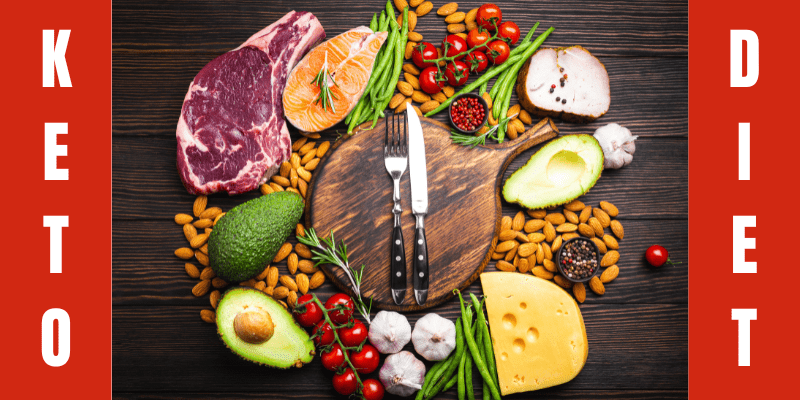The Ketogenic Diet, often referred to as “keto,” has surged in popularity over the past few years, captivating those looking to explore the benefits of a low-carb lifestyle. At its core, the ketogenic diet promises a way to induce ketosis, a state where the body shifts from burning carbohydrates to fat as its primary fuel source. This approach offers a pathway to weight loss and claims to enhance overall health and energy levels.
In this blog post, we’ll dive deep into the world of the ketogenic diet, exploring everything from its foundational principles to practical tips for integrating this diet into your daily routine. Whether you’re a seasoned keto enthusiast or curious about starting, this guide provides a comprehensive understanding of the ketogenic diet, ensuring you’re well-equipped to embark on or continue your low-carb journey.
We are here to offer our knowledge, but please do not interpret it as medical advice. If you have any questions, speak with your healthcare practitioner.
Understanding the Ketogenic Diet
The Ketogenic Diet, a unique approach to eating that emphasizes a drastic reduction in carbohydrate intake in favor of fats and a moderate protein consumption, has gained a significant following for its ability to promote weight loss and improve health. This section delves into what exactly the ketogenic diet is, its origins, the science behind it, and its various forms, providing a solid foundation for those looking to embark on this low-carb journey.
What is the Ketogenic Diet?
The goal of the high-fat, moderate-protein, extremely low-carb ketogenic diet is to change your body’s metabolism from using glucose as its main fuel source to using fat and ketones. When the body consumes significantly less carbohydrates and more fat instead, it enters a metabolic state called ketosis. The state of ketosis enhances the body’s ability to burn fat for energy, resulting in enhanced brain function, weight loss, and greater energy.
Types of Ketogenic Diets
There are several variations of the ketogenic diet, each tailored to different needs and goals:
- Standard Ketogenic Diet (SKD): The most common version, consisting of very low carbs (5-10%), moderate protein (20-25%), and high fat (70-75%).
- Cyclical Ketogenic Diet (CKD): Involves periods of higher-carb refeeds, such as 5 ketogenic days followed by 2 high-carb days.
- Targeted Ketogenic Diet (TKD): Allows you to add carbs around workouts, catering to the needs of active individuals.
- High-Protein Ketogenic Diet: Similar to the standard version but includes more protein, with the ratio often being 60% fat, 35% protein, and 5% carbs.
We may collect a commission at no additional cost to you if you make a purchase through any of the affiliate links in this post.
The Science Behind Ketosis
A normal metabolic state called ketosis happens when the body runs low on glucose (its primary energy source) and starts breaking down fats for fuel, producing ketones. This shift from glucose to fat sets the ketogenic diet apart from many other low-carb diets. Achieving ketosis requires careful management of macronutrients, ensuring carbohydrate intake is low enough to force the body to turn to fat for energy. The process can significantly reduce blood sugar and insulin levels, alongside increased ketones, which have powerful health benefits.
Benefits of the Ketogenic Diet
Acclaimed for its distinct approach to fat consumption, the Ketogenic Diet has numerous health advantages, from enhanced mental clarity to weight loss. This section explores the diet’s compelling benefits, significantly boosting its popularity.

Weight Loss
One of the ketogenic diet’s most sought-after advantages is its ability to promote substantial weight loss. By switching the body’s metabolism from burning carbohydrates to burning fat, body fat percentage can be decreased without the need for compulsive calorie counting. This method can achieve long-term weight loss and maintenance at a healthy weight.
Improved Blood Sugar and Insulin Levels
The ketogenic diet is a potential dietary strategy for those with diabetes or at risk of getting the disease since it can have significant impacts on insulin and blood sugar levels. Reduced blood sugar and enhanced insulin sensitivity result from a reduced carbohydrate diet, which may lessen the need for medication and diminish the chance of developing insulin resistance.


Enhanced Brain Function
Ketones, produced during ketosis, are an efficient fuel source for the body and the brain. Many adherents of the ketogenic diet report improved focus, concentration, and cognitive function. Scientific studies support this enhanced brain performance, suggesting that ketones provide a more stable energy source for the brain than glucose, potentially improving mental performance and clarity.
Personal Success Stories
The ketogenic diet’s popularity is fueled by countless success stories from individuals who have transformed their health and lives. From significant weight loss achievements to dramatic improvements in chronic health conditions, personal anecdotes and testimonials offer powerful testimony to the diet’s effectiveness.
The benefits of the ketogenic diet are multi-faceted, touching on various aspects of health and wellness. While its primary allure may be weight loss, the diet’s ability to improve blood sugar levels, enhance brain function, and potentially benefit a wide array of health conditions makes it a compelling choice for many. However, it’s essential to approach the ketogenic diet with a balanced perspective, considering its advantages and challenges.
– “Transform your body into a fat-burning powerhouse, unlock unparalleled mental clarity, and journey towards optimal health. It’s not just a diet; it’s a gateway to a revitalized you” –

Momo & Nashi Keto Cheat Sheet Magnets Booklet | Keto Diet for Beginners & Dummies Kit | Magnetic Keto Food List Planning Tool | Chart Weight Loss | Low Carb Ketogenic Meal Plan | Baking | Recipes Guide

The Complete Ketogenic Diet for Beginners: Your Essential Guide to Living the Keto Lifestyle Paperback | December 20, 2016
How to Implement the Ketogenic Diet
Implementing the Ketogenic Diet successfully requires understanding which foods to embrace, which to avoid, and how to balance your meals to maintain ketosis. This section provides practical guidance on making the ketogenic lifestyle a seamless part of your daily routine.
Foods to Eat
The foundation of the ketogenic diet lies in selecting high-fat, moderate-protein, and low-carbohydrate foods. Here’s what to focus on:
| Fats | Avocado, coconut oil, butter, olive oil, and fatty cuts of meat are excellent sources |
| Proteins | Opt for grass-fed meat, poultry, fish, and seafood. Eggs are also a staple in the ketogenic diet |
| Vegetables | Choose low-carb vegetables like spinach, kale, broccoli, and cauliflower |
| Nuts and Seeds | Almonds, walnuts, flaxseeds, and chia seeds are great for snacking |
| Dairy | High-fat dairy products like cheese and full-fat yogurt can be included |
| Berries | In moderation, berries can provide a sweet treat without exiting ketosis |
Foods to Avoid
To maintain ketosis, it’s crucial to limit or eliminate high-carbohydrate foods:
| Sugary Foods | Soda, fruit juice, smoothies, cake, ice cream, candy |
| Grains and Starches | Wheat-based products, rice, pasta, cereal |
| Fruit | All fruit, except small portions of berries |
| Beans and Legumes | Peas, kidney beans, lentils, chickpeas |
| Root Vegetables | Potatoes, sweet potatoes, carrots, parsnips |
| Low-Fat or Diet Products | These are often high in carbs and sugar |
| Alcohol | Many alcoholic beverages can throw you out of ketosis due to their carb content |
Tips for Eating Out
- Choose meals centered around proteins and vegetables.
- Request substitutions, like extra vegetables instead of fries or rice.
- Opt for salads with olive oil or avocado-based dressings.
Making Keto a Lifestyle
- Plan your meals to avoid the temptation of non-keto foods.
- Stock up on keto-friendly snacks.
- Stay informed about the carbohydrate content of foods.
By following these guidelines, you can navigate the ketogenic diet with confidence, ensuring you stay on track towards your health and wellness goals. The transition to a ketogenic lifestyle involves learning and adaptation, but with the right preparation, it can become a seamless part of your daily life.
Challenges and Considerations
While the Ketogenic Diet offers numerous health benefits, it’s not without its challenges and considerations. Adapting to a keto lifestyle can come with initial hurdles, potential side effects, and nutritional concerns that are important to address for a successful and healthy keto journey.
Common Side Effects
Transitioning to a ketogenic diet may lead to what’s commonly known as the “keto flu,” a temporary condition characterized by symptoms such as fatigue, headaches, dizziness, and irritability. This occurs as the body adjusts to burning fat instead of carbohydrates for energy. Here are ways to mitigate these effects:
- Stay Hydrated: Increase your water intake to help alleviate symptoms.
- Electrolyte Balance: Supplement with sodium, potassium, and magnesium to prevent electrolyte imbalances.
- Start Slowly: Gradually reducing carb intake can help ease the transition and minimize symptoms.
Nutritional Deficiencies
A strict ketogenic diet can sometimes lead to deficiencies in certain vitamins and minerals, primarily due to the limited intake of fruits, certain vegetables, and whole grains. To counteract this:
- Diversify Your Vegetables: Include a wide variety of low-carb vegetables to ensure you’re getting a broad spectrum of nutrients.
- Consider Supplements: A multivitamin or specific supplements like Vitamin D, Omega-3s, and fiber can help fill any nutritional gaps.
Long-term Sustainability
Maintaining a strict ketogenic diet over the long term can be challenging for some people due to its restrictive nature. Finding a sustainable approach is key:
- Flexible Keto Options: For some, adopting a more flexible approach to keto, such as cyclical or targeted ketogenic diets, can make the lifestyle more sustainable.
- Listen to Your Body: Adjusting the diet based on personal health goals and how your body responds is crucial.
Importance of Hydration and Electrolyte Balance
Proper hydration and maintaining electrolyte balance are paramount on the ketogenic diet, especially since the diet’s diuretic effect can increase the risk of dehydration and electrolyte imbalances.

Adjusting to Social and Dining Out Situations
Adapting to social situations and dining out can pose challenges when following a strict ketogenic diet. Preparing and making informed choices can help you navigate these situations without derailing your diet goals.
While beneficial, the ketogenic diet requires careful consideration and adjustment to fit into one’s lifestyle healthily and sustainably. By acknowledging and preparing for its challenges, individuals can ensure a smoother transition to and maintenance of this lifestyle, maximizing the diet’s positive impacts on health.
Final Thoughts
The Ketogenic Diet stands out as a transformative approach to eating. It emphasizes high-fat, low-carb foods to induce ketosis, a metabolic state where the body efficiently burns fat for fuel. This comprehensive guide has walked you through the diet’s principles, its myriad health benefits, practical implementation strategies, and important considerations to keep in mind.
While the journey into ketosis may come with its set of challenges, from navigating the initial “keto flu” to ensuring long-term sustainability, the potential rewards are significant. Imagine the thrill of shedding those extra pounds, the joy of improved metabolic health, and the clarity of mind that comes with enhanced mental clarity. Armed with knowledge about the right foods to eat, ways to mitigate common side effects, and strategies to make the diet a sustainable part of your lifestyle, you’re well-equipped to explore the ketogenic diet’s potential to transform your health.
Always remember, the key to success with the ketogenic diet—or any dietary change—is personalization and moderation. This is your journey, and you have the power to make it work for you. Listen to your body, consult with healthcare professionals, and consider your unique health needs and goals as you embark on this low-carb journey. Whether you’re seeking to lose weight, improve your health, or simply explore a new way of eating, the ketogenic diet offers a promising avenue to achieve your wellness objectives.
As you consider whether the ketogenic diet is right for you, remember that the journey to health and wellness is profoundly personal. What works wonderfully for one person may be different for another. The ultimate goal is finding a way of eating that not only achieves your health goals but also fits your lifestyle, preferences, and well-being. Here’s to your health and finding the path that best suits you!











